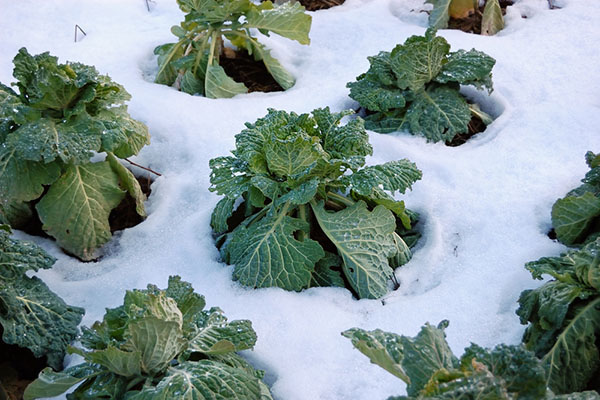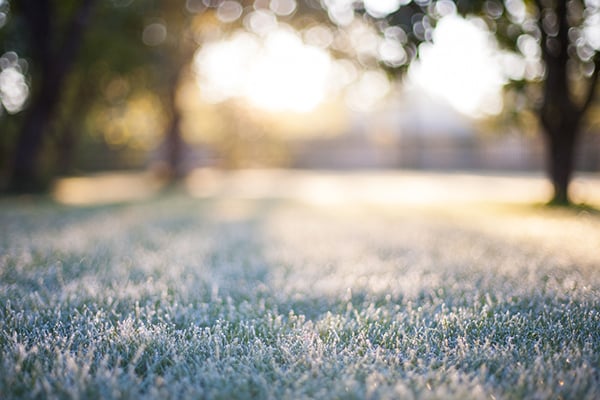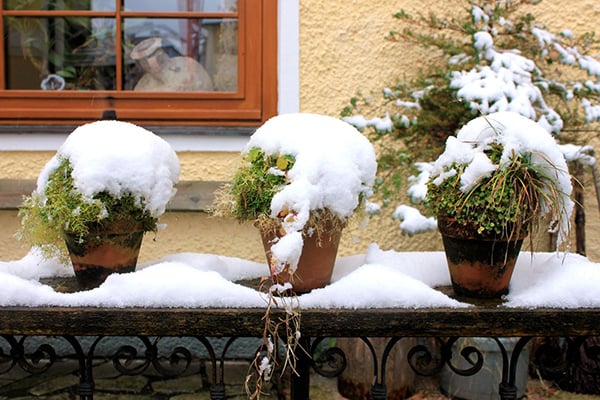First, check your USDA growing zone to see what the specific recommendations are for your area. In some cases, you may need to take steps to cover plants during hard frosts, heavy snow, or especially windy conditions. In other parts of the country, covering may not be necessary at all. Be sure to plant your winter garden with an eye toward the best sun exposure and the most protection from wind and cold.
Many gardeners actually enjoy winter planting because they don’t have to water and weed as often, and because there can be fewer bugs to control. Depending on your growing zone, some good plant choices include greens such as spinach, lettuce, arugula, chard, and kale. Broccoli, carrots, radishes, beets, cabbage, Brussels sprouts, and cauliflower also do well in cold temperatures in many parts of the country. Onions, including leeks, and garlic may also thrive.
Many herbs can also survive winter climates although they may go dormant or not grow as rapidly. Some herbs that can winter over include rosemary, parsley, Greek oregano, sage, thyme, and winter savory. You may also want to consider an indoor herb garden. Plant herbs in pots or containers and place them in windows or other sunny spots away from drafts. The herbs will need direct sunlight for several hours a day. Keep the soil moist, and cut herbs frequently to encourage growth._600x400.jpg)
If you don’t want to plan a full winter garden, you might think about planting some containers. Choose your container carefully, as you don’t want it to crack or break during freezing temperatures. For example, containers made from iron, stone, or wood are good choices while terra cotta materials are probably not winter safe. Larger containers are better for this purpose because they can hold more soil to insulate the plants’ roots from cold temperatures. Be sure to add mulch for additional warmth. Even though plants don’t usually need as much water in cold weather, it’s still important for the container to provide good drainage.

From the Ground Up: 10 Rules to Grow Your Best Winter Garden

If you’re an avid gardener who’s counting the days until spring, you may be looking for other ways to practice your hobby during these long winter months. There are many winter plants that you can cultivate to satisfy your urges and save you money.
Thinking about coverage?
Security for your home. Protection for your budget.
Because the containers won’t have as much soil area as a garden, it’s a good idea to select plants that are projected to thrive in a growing zone that is colder than yours. Again, check your USDA growing zone recommendations, but some good winter container plant choices might include holly plants, junipers, spruce, yucca, and boxwoods.
No matter how big or small, seasonal or year-round, a garden always adds a special touch to any home. Visit Lawn & Garden for more gardening tips and ideas.
Herbal Cheese Spread Recipe
- Here’s an easy herb recipe that takes just minutes to prepare:
-
- Combine 8 ounces of softened cream cheese with 1 teaspoon minced garlic, 1 teaspoon dried caraway seeds, ½ teaspoon seasoned salt, and 1 tablespoon each of the following fresh herbs: chives, dill, oregano, parsley.
- Place in a decorative crock or container, or roll into a log or ball and cover with plastic wrap.
- Chill in the refrigerator for two hours or longer, then serve with crackers as a snack or hors d’oeuvre
AHS assumes no responsibility, and specifically disclaims all liability, for your use of any and all information contained herein.
Don't worry. Be warranty.
Have a plan for your home when things don't go according to plan
Shop Home Warranties

